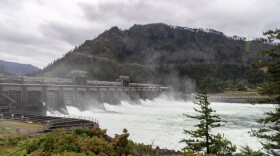Washington’s redistricting commission will pay fines and legal costs of more than $137,000 to settle two lawsuits filed by government transparency watchdogs after last year's redistricting talks ended in a display of chaos and deception.
The redistricting commission’s four members and nonpartisan chair will each pay $500 fines and undergo training in the open-meetings law.
And the commission agreed to pay $120,000 to cover the legal costs of the Washington Coalition for Open Government and another $15,000 for the legal costs of transparency activist Arthur West after admitting that its members violated the state’s Open Public Meetings Act, The Seattle Times reported.
Under a proposed consent decree announced Wednesday, the commission also pledged reforms to prevent a repeat of the illegal conduct that took place during last year's final negotiations over the state’s new congressional and legislative district maps.
The consent decree is subject to final approval by a Thurston County judge. It will not void or alter the political maps belatedly agreed to by the commission, which will be in place for the next 10 years.
The settlement terms were hailed Wednesday by the open government advocates who filed the lawsuits. In exchange for promised reforms, the plaintiffs dropped their request for courts to invalidate the commission’s final map agreement.
“This consent decree ensures that the next time redistricting maps are drawn, the people will know what is going to be approved beforehand, and the commission will not be free to produce final maps in a secret meeting at the party room of the Hampton Motor Inn in the wee hours of the morning,” West said in an emailed statement.
West was referencing the chaos that ensured as the bipartisan commission raced to try to meet a midnight Nov. 15 legal deadline to vote on the once-a-decade new maps, it convened a 7 p.m. online public meeting.
The four voting commissioners — Democrats April Sims and Brady Walkinshaw and Republicans Joe Fain and Paul Graves — vanished from public view for much of the next five hours as they tried to hash out final agreements at a hotel in Federal Way.
The commissioners reappeared just before midnight to take rushed votes on ostensible final map deals that were not publicly displayed. The next day, the commission members admitted they had actually failed to reach a final deal before the legal deadline, which meant the maps ended up before the state Supreme Court.
In December, the high court declined to exercise its authority to draw its own maps, deferring to the agreement forged by the two Democratic and two Republican commissioners, who were appointed by legislative caucus leaders.
In a news release, the redistricting commission said the settlement “will resolve the litigation and preserve the validity of the maps the Commission developed for legislative and congressional districts this decade.”
The commission pledged in the future to never convene a public meeting and then recess to talk in private, except for matters authorized to be discussed in closed executive sessions. It also agreed commissioners will not vote on final redistricting plans or frameworks in private, and will make final maps publicly available before voting on them.
Those promises of greater transparency will apply to the next redistricting commission, which will be appointed in 10 years, following the 2030 Census.






